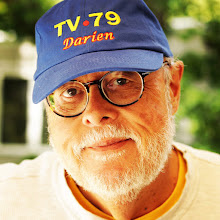"When Journalists Hit The Speaking Circuit" or "Turn Off That TV Camera!"
Why would an NPR correspondent delivering a speech refuse to allow media coverage?
That was the question I asked myself, and that correspondent, when she appeared in my town at the annual Darien / Norwalk (CT) YWCA "Women of Distinction" luncheon. As volunteer program director of my town's government cable-access TV channel, I was assigned to cover the awards ceremony at which Dina Temple-Raston was the invited (and well-paid) keynote speaker.
For weeks her appearance had been promoted, the notices touting her work as NPR correspondent covering national security and anti-terrorism. At $85 apiece, the chicken lunch at a swish country club was a big draw. One hundred and seventy-five tickets were sold.
The organizers from the YWCA asked our station, Darien TV79, to cover the event knowing that our audience would be several times larger even than the crowd in attendance. The award recipients, incredibly talented local women, deserved the community's kudos and airtime.
A week before the event I made the mistake of suggesting to organizers that they clear our videotaping with Ms. Temple-Raston, expecting that a fellow journalist would certainly welcome coverage. Boy, was I wrong.
A few days before the luncheon, the Y told me she would not allow us to videotape her speech. Her agent said it was an NPR rule. But when I checked with friends who worked at NPR, they said they knew of no such edict.
As a former radio anchor (at NBC News, where I received a Peabody Award) I still see myself as a journalist. Our local TV station prides itself on its C-Span style "gavel to gavel" coverage of town events. We never edit our coverage and we don't allow those we're covering to dictate when we turn on and off our cameras. No real journalist would.
What should we do? Cover the awards luncheon? Boycott the entire event? I sought counsel from working journalist friends. One suggested I enlist the help of SPJ (Society of Professional Journalists) or the ACLU. A local TV news director said, because it was a private event, the Freedom of Information Act wasn't applicable. The local NPR news director lamented my position but said there was little I could do.
Print reporters would be allowed to cover the speech. And photographers. But no TV and no audio recording. Why the double standard? I promised the Y only one thing: whatever happens, I intend to let folks know about the hypocrisy of their guest.
A day before the event, at my request, the Y sponsors circled back to me with more information. Apparently her agent was wrong. It was not an NPR's rule about no taping, it was Ms. Temple-Raston's rule. Clearly, the Juan Williams case (of NPR Staffers speaking off-air) has had a chilling effect on those NPR staffers' outside, money-making speaking gigs.
The day of the event I decided to give full coverage a final try. Arriving at the Woodway Country Club, I told the YWCA organizers that the community deserved to see the award winners and I promised to record only that... if I could speak to Ms. Temple-Raston and make a final appeal. Seconds later, she appeared and we shared a rather contentious two minute conversation.
"You know you cannot tape my speech"' she said. "So I've heard," I said, "But why? Is it really an NPR rule?". "No," she said, "It's just my personal preference. I am on vacation today."
Then I tried appealing to her as a fellow fifth-estater. "As a journalist are you comfortable in stopping my coverage of your speech?”
"Absolutely," she said without hesitation. "You're lucky I'm allowing you to tape the awards presentations!"
"That's not your call," I told her. "I'm here at the invitation of the YWCA."
"Well, that camera better be off. That's an ethical issue," she said, and then added icing to the cake... "and this conversation is off the record."
"No, this conversation is ON the record, Dina, and it is part of my coverage," I said.
At this point two other videographers arrived, one from The Patch and the other from News12, our local cable news operation. Dina visibly flinched, turning to both and reminding them they too could not tape her speech. "No problem," said one of them.
Her final comment came as a somewhat rhetorical question... "why are you being so hard-assed (about this)?"
Why? Because you, Ms Temple-Raston, can't have it both ways. You cannot promote your private, paid speaking business on the basis of your NPR work and then pretend that your comments are somehow private. Nobody came to pay $85 to hear you as an individual. They came to bask in the glory of your media aura.
If you brand yourself as part of NPR, your remarks should be open to public coverage. I’m guessing that you would tolerate no less in your own journalistic endeavors, would you?
Indeed, with all cameras turned off, Ms. Temple-Raston’s speech was no more than a series of audio clips from NPR and a few stories of her time in war zones. (I was allowed to take notes). As the women dined on their chicken she recounted an alleged Muslim honor killing she’d once covered, giving a detailed description of the wife being stabbed so many times OJ-style she was decapitated. Bon appetite.
Finishing her remarks, she sat down and the camera was turned back on as the awards were presented. It was a wonderful community celebration and our town TV station covered it as such.
The guest speaker hardly committed any “news” aside from being a turncoat to her journalistic ethic of an open and free press. I just hope that next year’s ceremony isn’t similarly distracted.
Labels: NPR Dina Temple-Raston journalism ethics Darien CT YWCA


